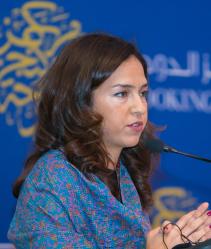Content from the Brookings Doha Center is now archived. In September 2021, after 14 years of impactful partnership, Brookings and the Brookings Doha Center announced that they were ending their affiliation. The Brookings Doha Center is now the Middle East Council on Global Affairs, a separate public policy institution based in Qatar.
This post is the first in the Pandemic Politics series.
Is the coronavirus pandemic a combatant that is waging an offensive war by turning the entire world into a battlefield? Or is it a public health crisis that has exposed the unpreparedness of countries, both rich and poor, to effectively and swiftly overcome it? Why does it matter how we frame the actions taken to fight the coronavirus? Some political leaders have declared that they are ‘wartime’ presidents waging war against the enemy virus in an attempt to create a heroic legacy for themselves. Is this rush towards battle analogies, rather than sensible foresight to prepare for an impending emergency, a preview of how states will handle the coming climate crisis?
Employing the language of war has major implications, especially as an increasing number of states implement emergency powers. As Christine Schwobel-Patel cautions, “we tend to forget that emergency powers have a habit of sticking around far longer than the crisis requires.” Rather than declare a war on the coronavirus, she argues, what is needed more than ever is the language and actions of international solidarity. Richard Haass, on the other hand, laments the lack of “defensive equipment” to effectively fight this war of “necessity,” one that “must be fought for the foreseeable future in ways designed to frustrate the enemy rather than defeat it.” United Nations Secretary General, Antonio Guterres, urged the international community to cease all wars. He calls for a global ceasefire where all wars must end to allow the world to focus its efforts on fighting the real common enemy: COVID-19.
Yemen is a powerful example of how war and infectious disease are inextricably linked. Five years since the onset of war in Yemen, millions have been affected by mass starvation, cholera, diphtheria, and other disease outbreaks. These afflictions are all manmade. In this sense, as Catherine Connolly reminds us, “The relationship between war and disease is not benign, and it is certainly not positive – war does not cure or cleanse.”
Below is a short selection of articles for more on this debate. Happy reading.
“It is time to put armed conflict on lockdown and focus together on the true fight of our lives.” – The Fury of the Virus Illustrates the Folly of War Antonio Guterres, United Nations Secretary General, 23 March 2020.
“Putting off the decision to go on the offensive against COVID-19 – treating a war of necessity as a war of choice – has proved extraordinarily costly in terms of lives lost and economic destruction.” – At War With A Virus, Richard N. Haass, President of the Council on Foreign Relations, 6 April 2020.
“[W]ar talk allows for antagonism to be directed towards the “enemy”, instead of requiring the neoliberal state to explain years of underfunding of public services.” We Don’t Need A ‘War’ Against Coronavirus. We Need Solidarity, Christine Schwobel-Patel, 6 April 2020
“War and the spread of disease have always been related – they were the combined agents of European genocides of Indigenous populations throughout the Americas, and were often intertwined with colonialism.” War and the Coronavirus Pandemic, Catherine Connolly, 9 April 2020.
The Brookings Institution is committed to quality, independence, and impact.
We are supported by a diverse array of funders. In line with our values and policies, each Brookings publication represents the sole views of its author(s).




Commentary
Op-edPandemic politics: Coronavirus: War-talk or crisis-talk?
April 22, 2020